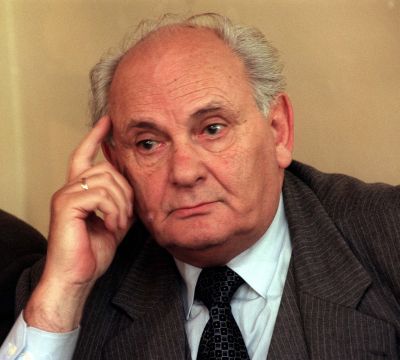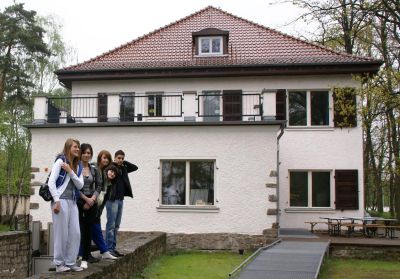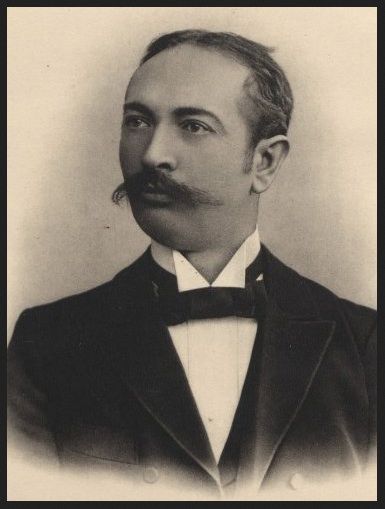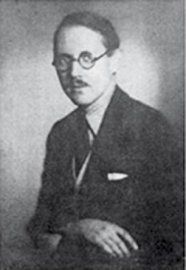Andrzej Szczypiorski

In 2006, six years after his death, the former villa of the SS “inspector” Theodor Eicke in the Sachsenhausen concentration camp, now a young people's meeting place, was renamed the Andrzej Szczypiorski House. This meeting place would have been entirely to his taste: a place near Berlin where Germans and Poles can come together in friendship. Here Andrzej Szczypiorski was held prisoner in the Sachsenhausen concentration camp. Here he survived the Nazis brutal attempt to exterminate all their opponents.
To call Andrzej Szczypiorski just a Polish writer would be to belittle him. His life is also primarily notable for his social and political commitment. In his books and social activities he mainly reworked his experiences during the Second World War. As in literature so in life, Andrzej Szczypiorski promoted reconciliation and understanding between Germans and Poles. Andrzej Szczypiorski is an important link between the generations and the two nations. In 1995 he was awarded the Grand Cross with Star for Distinguished Service of the Order of Merit of the Federal Republic of Germany as recognition of his work in reconciling Germans and Poles.
Biographical data
- 3. February 1928: born in Warsaw
- 1944 Participant in the Warsaw uprising
- 1944 Imprisoned in the Sachsenhausen concentration camp
- 1945 Liberated. Return to Warsaw
- 1947 Graduates from the Academy of Political Sciences in Warsaw, (courses in foreign relationships and consular service)
- 1948–1951 Editor of the magazine “Zycie Warszawy”
- 1950–1955 Chief editor of the Polish broadcasting service in Katowice
- 1956–1958 Adviser to the Polish Embassy in Denmark
- 1958–1964 Editor at the Polish broadcasting service in Warsaw
- 1965–1975 Editor of the weekly journal “Polityka”
- 1977 onwards: opposition activities with the Workers Defence Committee and the PPN. Publications in underground newspapers
- 1981 Interned after the declaration of martial law in Poland
- 1989–1991 Political activities in the democratic parties “Komitet Obywatelski” (Citizens Committee) and “Unia Demokratyczna” (Democratic Union)
- 1989 Nelly Sachs Prize for literature
- 1995 Andreas Gryphius Prize for literature
- 1995 Grand Cross with Star for Distinguished Service of the Order of Merit of the Federal Republic of Germany in recognition of his work in reconciling Germans and Poles.
- 1997 Order of Polonia Restituta (Order Odrodzenia Polski / Order of the Rebirth of Poland)
- 16th of May 2000: Andrzej Szczypiorski dies in Warsaw
Bibliography / Selection of books in German
- 1979 Eine Messe für die Stadt Arras
- 1988 Die schöne Frau Seidenman
- 1989 Amerikanischer Whiskey
- 1990 Notizen zum Stand der Dinge
- 1991 Nacht, Tag und Nacht
- 1993 Der Teufel im Graben
- 1994 Selbstporträt mit Frau
- 1993 Den Schatten fangen
- 2000 Feuerspiele
Biographical additions
Andrzej Szczypiorski not only consciously worked in the cause of German-Polish reconciliation, he was also committed to the “Society for Polish-Israeli Friendship” (Towarzystwo Przyjaźni Polsko-Izraelskiej TPPI).
Andrzej Szczypiorski was the chairman of the “Polish Foundation for Children and Young People”. Since 2000 the foundation has awarded the Andrzej Szczypiorski prize to people who have a “positive influence on their social environment”.
In 2007 Polish television broadcast an episode from the popular historical series “Errata do biografii” (Correcting Biographies), on the life of Andrzej Szczypiosrki and above all on his collaboration with the State Security Forces (Służba Bezpieczeństwa) from 1955 onwards. The filmmakers drew their material from documents in the Polish National Remembrance Institute (IPN).
Adam Gusowski, December 2013
Sources:
Encyklopedia PWN
Instytut Pamięci Narodowej IPN
Haus der Begegnung “Adrzej Szczypiorski” in Sachsenhausen
Krzysztof Kurek z Polskiej Fundacji Dzieci i Młodzieży w Warszawie
Deutsche Nationalbibliothek



